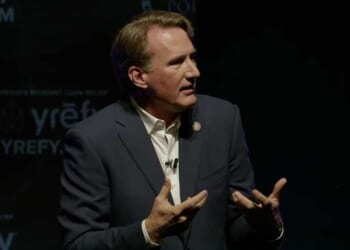It is only ten months into Donald Trump’s second term and supporters are already describing Trump’s presidency as “epic” and declaring an “Age of Trump.” Trump’s second term has been so replete with actions of historic consequence that even the president’s traditional opponents are acknowledging its significance. Liberal Politico published a column noting that Trump “is a force of history,” and Rich Lowry, a subdued never-Trumper in 2016, when his National Review devoted a full issue to defeating Donald Trump, has claimed that Trump “may be on the path to the most consequential presidency since Ronald Reagan’s.”
Trump’s success thus far is driven by his willingness to tackle the country’s most vexing problems, including securing the southern border, throttling elite universities, removing criminal aliens, and scrapping affirmative action and DEI programs.
But Trump’s June 21, 2025, strike on Iran’s nuclear facilities — Operation Midnight Hammer — remains his defining achievement. For the first time in over four decades, an American president broke Iran’s campaign of existential hatred of the U.S. and reasserted American dominance in the Middle East. Just as importantly, by neutering Tehran, Trump slapped back the growing challenge to America’s global leadership from an ugly faction in his own base.

Subscribe to The American Spectator to receive our latest print magazine.
Immediately after Trump took office, there appeared a cadre of influential “America First” MAGA voices — Tucker Carlson, Candace Owens, Dan Bilzerian, Jake Shields, Nick Fuentes, Dave Smith, and Ian Carroll to name only a few — who were intent on restricting America’s field of action in the world. This bloc of MAGA “Restraintists” varies in its views, yet most members share a strong desire for strict nonintervention abroad and tighter immigration restriction at home, views that are not new in the Republican Party and that still carry great resonance.
However, their response to Trump’s attack on Iran suggests something more: an extreme aversion to even the justified exercise of American power, a sentiment that was previously seen only among the woke Left.
Most of the Restraintists do not share the extreme white supremacist views of Nick Fuentes, but Fuentes provides a helpful summary of their perspective: “America is the seat of the liberal empire that controls the world. And we are enemies of that liberal order because of our ‘old world views.’ And so, to the extent that Russia is rolling that back, or China is rolling that back … then we have to support these causes.”
It is striking how closely this view resembles that of the woke Left. The Restraintists argue against U.S.-dominated “liberal hegemony.” The far Left argues against U.S.-dominated “globalization.” Both sides see a small group of powerful elites presiding over a system of global politics that suits the needs of elites at the expense of all others, and both prioritize knocking the U.S. from its dominant place in this broken world. Little wonder that some critics have taken to calling some Restraintists the “woke Right.”
The Restraintists wrap themselves in a thin gloss of intellectual respectability on foreign policy from what they call the “realist” school, which was once associated with luminaries such as Hans Morgenthau, George Kennan, and Kenneth Waltz. But today the Restraintists look to more controversial figures such as Stephen Walt, Jeffrey Sachs, and John Mearsheimer, the last of whom offers the theory that the Middle East’s instability stems from Israel’s undisclosed possession of nuclear weapons. Therefore, the logic runs, the way to stabilize the Middle East is to balance Israel’s power by allowing Iran to have a bomb.
It is remarkable that these “realists” see Iran as capable of peacefully possessing a nuclear weapon despite its consistent threats to destroy Israel (“the little Satan”) and the U.S. (“the great Satan”), and its arming of terrorist groups such as Hamas, Hezbollah, and the Houthis for just that purpose.
But only such a distorted view of the world can explain their hysteria in the months leading up to Midnight Hammer. Candace Owens — a former podcaster for the Daily Wire who calls Judaism a “pedophile-centric religion that believes in demons … [and] child sacrifice” — urged U.S. service members to refuse deployment rather than “die in a foreign land.” Libertarian comic and frequent Joe Rogan Experience guest Dave Smith took Tehran’s side after Israel’s attack and branded Trump “a war criminal who should spend his life in prison,” mocking him as “the most impotent b***h of a leader imaginable.”
Most memorable was the shrill voice of Tucker Carlson, who prognosticated defeat for the U.S., proclaiming that the “first week of a war with Iran could easily kill thousands of Americans. It could also collapse our economy…. An attack on Iran could easily become a world war. We’d lose.”
All of this came to a head in June when Israel kicked off its Rising Lion campaign to destroy Iran’s nuclear weapons program. National Review’s Haley Strack posted a round-up of Restraintist responses:
Darryl Cooper … said on Thursday that America should “commence airstrikes on Tel Aviv immediately.” … Nick Fuentes said “this is the final battle in Israel’s 50-year reign of terror.” … Candace Owens called Israel’s “bloodlust” demonic. Matt Stoller doesn’t think Israel’s “bloodthirsty insanity” should be “our problem.” … UFC fighter and podcaster Jake Shields is “sick and tired of paying for and fighting Jewish wars” and demanded the destruction of Israel. Dan Bilzerian said …, “If I was the president, I would round up every politician supporting Israel and have them all tried for treason.”
By itself, this online meltdown over Israel’s and Trump’s attacks on Iran is enough to suspect the Restraintists of pining for a nuclear Iran, a prospect one can easily impute from Tucker Carlson’s X post justifying Iran’s need for a bomb: “Iran also knows it’s unwise to give up its weapons program entirely. Muammar Gaddafi tried that and wound up sodomized with a bayonet. As soon as Gaddafi disarmed, NATO killed him. Iran’s leaders saw that happen. They learned the obvious lesson.”
These frenzied pronouncements reveal that Restraintists share with the woke Left a belief that America’s power must be counterbalanced by fortifying U.S. rivals. Barack Obama, after all, toured the world apologizing for America’s postwar leadership and suggested that America now “lead from behind” before empowering Iran with a favorable nuclear agreement and pallets of cash. All of this amounts to little more than a strategy for diminishing U.S. influence. As journalist Lee Smith observed, “The self-described pro-Trump opposition to Trump’s Iran policy is just Obama in a MAGA skin suit — opposed to American exceptionalism and keen to cripple what it believes is truly the world’s most dangerous country: ours.”
Restraintists share with the woke Left a belief that America’s power must be counterbalanced by fortifying U.S. rivals.
When Trump told reporters, “I don’t know what Tucker Carlson is saying,” and then posted on Truth Social, “Somebody please explain to kooky Tucker Carlson that Iran cannot have a nuclear weapon!,” it was a sweeping rejection of Carlson’s opposition to striking Iran and of the Restraintists’ view that America’s global power lacks legitimacy.
The Restraintist hostility to American power casts light on their animosity toward Israel. Hudson Institute senior fellow Rebeccah L. Heinrichs sees their bitter enmity toward Israel (and Jews) as not only immoral, but “also strategic.” If the Restraintists want to diminish U.S. power in the world, their attacks on Israel make sense. Few countries have contributed more to America’s victory in the Cold War and to sustaining U.S. hegemony than Israel.
For decades, Israel’s sometimes surprising battlefield successes highlighted the superiority of U.S. weapons over Soviet arms, saving the U.S. billions in wasted weapons programs and discouraging Moscow’s mischief-making worldwide — one of the reasons Ronald Reagan named Israel a “major non-NATO ally” in 1987.
Israeli intelligence was indispensable to U.S. counterterror efforts after the Shah’s overthrow in 1979 and once more after 9/11. Israel also eased America’s path in the 1991 Gulf War by destroying Iraq’s Osirak nuclear reactor in 1981 — an act later acknowledged by Defense Secretary Dick Cheney as having “made our job much easier in Desert Storm.” In 2007, Israel repeated the feat by eliminating Syria’s Al-Kibar nuclear reactor.
Even in the current conflict, Israel effectively paved the way for the United States to carry out Midnight Hammer by dismantling Hezbollah, which led to the fall of Syria’s Bashar al-Assad, delivering a major setback to the Iran–Russia–China axis in the region. Israel then cleared the deck by crippling Iranian air defenses for America’s Midnight Hammer, enabling U.S. pilots to operate their B-2 stealth bombers without fear of lethal resistance. The result was an unprecedented moment in which a sworn enemy, for the first time, lay prostrate before U.S. military power.
Given this remarkable level of cooperation and shared sentiment between the two countries, anti-Israel animus is appealing for those, such as Obama and the Restraintists, who are seeking to roll back America’s global influence. As reporter Lee Smith writes, “Israel represents American power in the Middle East. Weakening Israel is therefore a way of weakening the United States.”
The Restraintists completely misread Trump’s vision of “America First.” Even before his bombing of Iran’s nuclear sites, Trump’s proposal to rebuild Gaza into a “Riviera of the Middle East,” his assassination of Iran’s Qasem Soleimani, his hits on Houthi rebels in Yemen, and his belated agreement to aid Ukraine’s war effort all attest to his considerable distaste for an American retreat from global affairs. As Director of the Center for Peace and Security in the Middle East Michael Doran has explained, “From the start, his approach emphasized wielding American power decisively while avoiding prolonged quagmires.”
The Restraintists completely misread Trump’s vision of “America First.”
Thanks to his courage in repudiating some of his own Restraintist supporters, Trump has steered Republicans away from the electoral black hole of perilous global retreat. The Restraintist stance, after all, remains at odds with American sentiment — especially within the Republican Party, including its MAGA base. A GrayHouse poll reported on by the Washington Free Beacon immediately after the strikes on Iran showed that 90 percent of Trump voters supported the attack.
Trump understands that MAGA and the broader American public don’t want the country to recoil into a protective shell when Russia and China are on the march. On the Middle East, Doran writes, “Americans … understand that leaving the Middle East altogether and thereby handing control of the global energy markets to China is lunacy.”
After Tucker Carlson accused Trump of betraying his “America First” principles, Trump told the Atlantic, “Well, considering that I’m the one that developed ‘America First’ … I think I’m the one that decides that.”
Trump’s reprimand might lack the intellectual gravitas of William F. Buckley, who paved the way for the Reagan Revolution by warning conservatives away from the “crackpot alley” of the John Birch Society. But it is of no less political importance that we have a president who tells the Restraintist Right, as he did in July on Truth Social, “Let these weaklings continue forward and do the Democrats work … I don’t want their support anymore! Thank you for your attention to this matter.”
Seth Forman is an associate editor at The American Spectator.
Subscribe to The American Spectator to receive our fall 2025 print magazine.








![Keith Ellison Caught Promising to Fight State Agencies for Somali Fraudsters [WATCH]](https://www.right2024.com/wp-content/uploads/2026/01/Keith-Ellison-Caught-Promising-to-Fight-State-Agencies-for-Somali-350x250.jpg)







